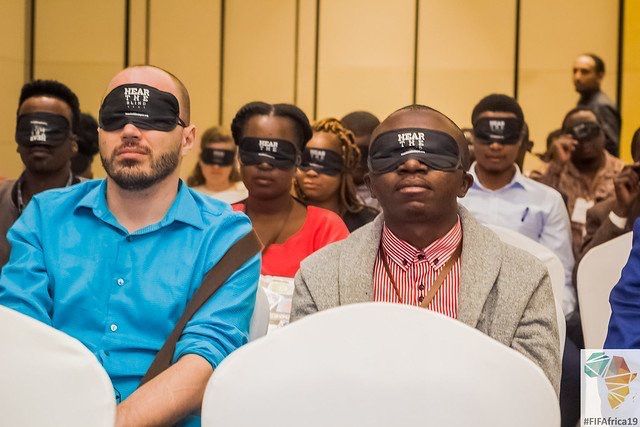By Hilda Nyakwaka |
The Forum on Internet Freedom in Africa event this year was hosted in Addis Ababa between 23rd and 26th September. This event was considered monumental because a few months prior, there were internet shutdownsand this was a testament to the progressive strides Ethiopia was making in creating an open and accessible internet for its citizens.
The first two days of the week were dedicated to a training on the Universal Periodic Review (UPR) hosted by Small Mediaand Data4Changeand with representatives from over 10 African countries.The UPR, an innovation by the UN Human Rights Council, is a periodic review of the human rights records by the 193 member states of the UN (UPR). The main purpose of this training was to see how to champion for digital rights at the coming UPR.
Over these two days participants went over different concepts such as the importance of making recommendations to countries through the UN in an effort to improve the digital space, how to build capacity for recommendation-making processes, how to increase participation in the UPR process and how to foster collaborations between participants from different countries.
Some common concerns that the participants shared about the previous UPR cycles included the focus of civil society organisations on report writing as opposed to lobbying, lack of accessibility to stakeholder reports by diplomats and other concerned citizens and the lack of focus on digital rights and other human rights when making recommendations.
Some of the key takeaways were the toolsbuilt by Data4Change to guide interested parties in creating advocacy strategy plans. These tools help users to not only see what recommendations have been made to their countries of interest, but to also discover and fill the gaps in the recommendations made and which countries would be important to partner with. During this session, all participants were able to make and rate each other’s recommendations to their individual countries with specific attention to digital rights.
There was also a general agreement to increase local stakeholder mobilization, awareness workshops, jointly documenting abuse of digital rights so as to have greater impact and lastly to properly document all our work. At the end of the training, we were all awarded certificates of completion for attending the trainings and completing online courses pertaining to the UPR process.
The next two days marked the official start of the forum, which was open to everyone who had registered to attend. There were several panel sessions occurring simultaneously focusing on different internet issues across Africa. The opening panel was attended by H.E Dr. Getahun Mekuria, the Minister of Information and Technology in Ethiopia who reiterated the government’s plans to liberalize the telecommunications industry in Ethiopia and to reduce cases of shutdowns in a move to increase and improve the citizens’ access to the internet.
Sessions that I was particularly interested in narrowed, their focus to how marginalized and targeted communities interact with technology and some of the solutions they have adapted to their situations.
One such session was on the importance of African feminist movements in improving women’s voices in the digital space as moderated by Rosebell Kagumire, an award-winning blogger and Pan-African feminist . In this session, feminists from across the continent reiterated the ways in which offline patriarchal systems were replicated online against women. One point that resonated with most attendees was that women were still being policed and bullied out of a lot of social apps such as Twitter and most women preferred to be invisible. Cases were brought up on how hypervisible women were facing a lot of challenges.
In addition to this, there was also a celebratory moment when the panelists mentioned some of the movements that succeeded in championing for women’s rights both offline and online some as big and visible as the #TotalShutdownKE that fought against femicide in Kenya and the revolution in Sudan that had women at its forefront and which gained support from across the world. A major gap that was identified in this conversation was the need for building more local movements and having inclusivity within the movement to include women from the LGBTQI community as their online experiences were unidentified despite being equally important.
Another key session was held on technology and disability where persons living with disabilities spoke about how to use ICTs to reduce accessibility barriers. Some of the challenges the panelists included insufficient ICT training, lack of accessibility features on even the most basic layouts of sites and apps, affordability of devices with accessibility features as one of the panelists cited that a mobile phone with accessibility features would cost one $800 which most Africans both abled and disabled cannot afford comfortably.
An Ethiopian Case Studywas used to explain just how crucial and important it was to provide holistic education and inclusive support to people living with disabilities within our communities. Some of the solutions that the panelists offered up to improve accessibility included proper policy implementation and strict punitive measures for those who failed to implement any policies, being intentional by teaching about accessibility features right from software development classes at the college level and putting a cap to funding that requires companies and organizations to provide opportunities for and hire people living with disabilities in their firms and provide ample accessibility features before receiving full funding. There was also a call to create awareness campaigns to make citizens aware of the challenges that a large section of our communities experience and how to develop protection mechanisms for them.
In conclusion, FIFAfrica 19 was a great opportunity to share experiences and solutions to challenges we as Africans seem to be experiencing when it comes to digital rights and internet freedom. In case you weren’t able to join us in Addis for this edition of FIFAfrica, find herethe agenda for the forum, somelive tweets from the event and the report on the State of Internet Freedom in Africaby CIPESA, launched at the forum.

